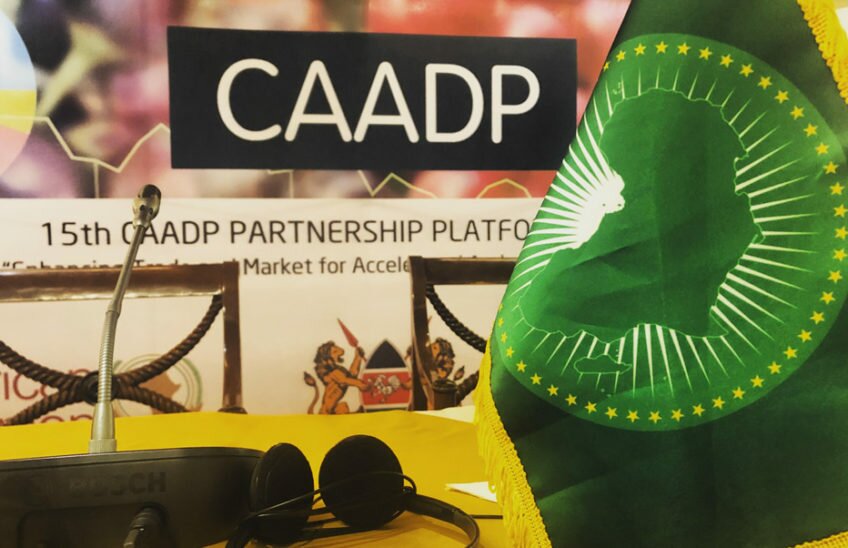This article originally ran on Agrilinks on June 13, 2019
Smallholder farmers are the heart of Africa’s agricultural transformation in Africa. In fact, according to FAO, “80% of the farmland in sub-Saharan Africa and Asia is managed by smallholders (working on up to 10 hectares)”. With agriculture’s central role in our society, Africa has the ability to feed every man, woman or child. Yet, Africa is still a net importer of food, spending up to USD 35 billion annually on food, a number that is expected to rise to 110 billion by 2025. If smallholder farmers are at the heart of agriculture, how do we put them at the heart of food security policy solutions?
With malnutrition rates on the rise and the great opportunity to transform Africa’s economy through agriculture, African heads of state in 2003 launched the Comprehensive African Agriculture Development Programme (CAADP). Africa’s progress in meeting the continental commitments set out in the policy program to reduce poverty and increase food security by 2025 is important for small holder farmers everywhere, not only in Africa. The processes, and ultimately its results, already provide a case study and will be an instructive model for food security policy anywhere and for anyone, including smallholder farmers.
So you might be asking, what were the commitments that Africa made and how is this progress being tracked?
In 2018, the African Union released its Inaugural Biennial Review (BR) Report of the African Union Commission on the Implementation of the Malabo Declaration, declaring it a major review of the Africa’s progress toward self-reliance and transparency. “We can and must do better,” declared Dr. Godfrey Bahiigwa, Director of the Department of Rural Economy and Agriculture of the African Union Commission, highlighting that “self-reporting on 43 indicators across the seven commitments of the Malabo declaration, showed that less than half — 20 out of 47 AU member states that reported — [were] on track to meet the Malabo Declaration goals and targets by 2025.”
The decision that led to the African Union even being able to calculate this progress may be the central lesson for all of us to learn from, especially because of its importance to uplifting smallholder farmers; there was adaptive management decision made to adjust after the agreement’s first ten years.

From 2003 – 2013, with broad goals and a few specific ones, CAADP focused attention and galvanized action on increasing public investment into agriculture and urging faster agricultural growth as agricultural production became an important issue on the continental agenda. A 2010 report from AUDA-NEPAD noted that “CAADP’s biggest disappointments have been its failure to secure greater understanding and ownership of CAADP at country level, and to not achieve more in terms of increased investment in the sector by governments and development partners.”
In 2014, realizing that agricultural transformation was a more complex, multi-faceted challenge, African leaders rejuvenated CAADP through the Malabo Declaration. The Malabo Declaration broadened the goals of CAADP to include seven high-level commitment areas that span a wide range of issues, policies, and programs relevant to agricultural transformation in Africa with very specific targeted results that would be measured. Most importantly, the Malabo Declaration focused CAADP on accountability for actions and results by 2025, with the intent of eliminating the lethargy that had started to set in during the closing years from CAADP’s birth in Maputo.
By 2018 the first Biennial Review was conducted, giving us a snapshot into progress and a picture into where countries need to close gaps in achievement. As the 15th convening of the CAADP Partnership Platform is being held this this week in Nairobi, Kenya, partners from across the continent are focused on issues of intra-African trade and economic development, a major deficit identified in data from the first biennial review. In the forefront of these meetings will be the ongoing 2nd Biennial Review process to be concluded and released as a report in January 2020. During these meetings the African Union also released a digitial communications toolkit, including interactive data tools, for helping leaders, advocates, and institutions communicate about and educate the public about CAADP and the Biennial Review.
With nearly five years remaining to achieve CAADP’s goals, what can the world learn right now from Africa’s self-led grand challenge to achieve food security, reduce poverty and improve nutrition? How have things changed for food security policy development at the continental, national and sub-national levels? As a result of the Biennial Review process, are countries now more energized to drive agricultural transformation agenda? Most importantly, how will reaching these African-led policy goals help smallholder farmers to contribute to continental food security and nutrition?
Africa Lead, one of USAID and Feed the Future’s food security and resilience capacity building programs, has been working to support the African Union’s CAADP goals of reduced hunger and poverty by supporting the transformation of African leaders and organizations, activating networks and collaborative action, and empowering African-led policy solutions to advance Africa’s own agenda for food security and resilience. As part of Africa Lead’s Final Program Year Learning Series, leaders at the heart of the CAADP process will explore the answers to these important questions about CAADP in an Agrilinks webinar on June 20th 2019, titled: Catalyzing Action & Agricultural Transformation in Africa – Taking the Pulse of CAADP.
Coming off the heels of the 15th CAADP Partnership Platform meetings in Nairobi, the webinar will also review important updates on the process and allow for reflection from leaders who have been at the heart of CAADP’s amazing journey over the last two decades. We welcome a global audience to discuss the relevance of CAADP’s lessons that can be applied in the global food security policy context.
The webinar was held on June 20, 2019 – view the webinar and download CAADP related resources
Robert Ouma is the Senior Policy Advisor for Africa Lead, one of Feed the Future and USAID’s food security and resilience capacity building programs in Africa.
